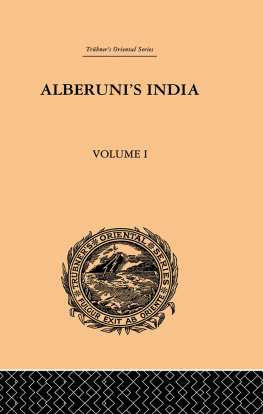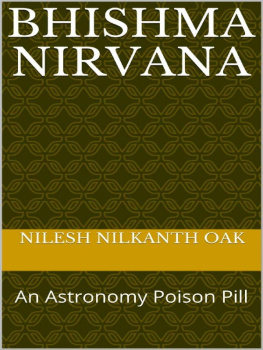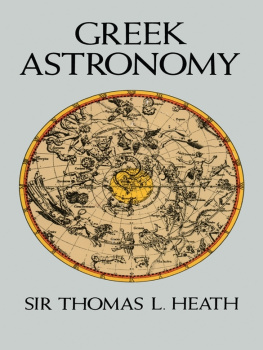ON THE HINDUS IN GENERAL, AS AN INTRODUCTION TO OUR ACCOUNT OF THEM.
Page 9.
BEFORE entering on our exposition, we must form an adequate idea of that which renders it so particularly difficult to penetrate to the essential nature of any Indian subject. The knowledge of these difficulties will either facilitate the progress of our work, or serve as an apology for any shortcomings of ours. For the reader must always bear in mind that the Hindus entirely differ from us in every respect, many a subject appearing intricate and obscure which would be perfectly clear if there were more connection between us. The barriers which separate Muslims and Hindus rest on different causes.
Desription of the barriers which separate the Hindus from the Muslims and make it so particularly difficult for a Muslim to study any Indian subject.
First, they differ from us in everything which other nations have in common. And here we first mention the language, although the difference of language also exists between other nations. If you want to conquer this difficulty (i.e. to learn Sanskrit), you will not find it easy, because the language is of an enormous range, both in words and inflections, something like the Arabic, calling one and the same thing by various names, both original and derived, and using one and the same word for a variety of subjects, which, in order to be properly understood, must be distinguished from each other by various qualifying epithets. For nobody could distinguish between the various meanings of a word unless he understands the context in which it occurs, and its relation both to the following and the preceding parts of the sentence. The Hindus, like other people, boast of this enormous range of their language, whilst in reality it is a defect.
First reason: Difference of the language and its particular nature.
Further, the language is divided into a neglected vernacular one, only in use among the common people, and a classical one, only in use among the upper and educated classes, which is much cultivated, and subject to the rules of grammatical inflection and etymology, and to all the niceties of grammar and rhetoric.
Besides, some of the sounds (consonants) of which the language is composed are neither identical with the sounds of Arabic and Persian, nor resemble them in any way. Our tongue and uvula could scarcely manage to correctly pronounce them, nor our ears in hearing to distinguish them from similar sounds, nor could we transliterate them with our characters. It is very difficult, therefore, to express an Indian word in our writing, for in order to fix the pronunciation we must change our orthographical points and signs, and must pronounce the case-endings either according to the common Arabic rules or according to special rules adapted for the purpose.
Add to this that the Indian scribes are careless, and do not take pains to produce correct and well-collated copies. In consequence, the highest results of the authors mental development are lost by their negligence, and his book becomes already in the first or second copy so full of faults, that the text appears as something entirely new, which neither a scholar nor one familiar with the subject, whether Hindu or Muslim, could any longer understand. It will sufficiently illustrate the matter if we tell the reader that we have sometimes written down a word from the mouth of Hindus, taking the greatest pains to fix its pronunciation, and that afterwards when we repeated it to them, they had great difficulty in recognising it.
As in other foreign tongues, so also in Sanskrit, two or three consonants may follow each other without an intervening vowelconsonants which in our Persian grammatical system are considered as having a hidden vowel. Since most Sanskrit words and names begin with such consonants without vowels, we find it very difficult to pronounce them.
Besides, the scientific books of the Hindus are composed in various favourite metres, by which they intend, considering that the books soon become corrupted by additions and omissions, to preserve them exactly as they are, in order to facilitate their being learned by heart, because they consider as canonical only that which is known by heart, not that which exists in writing. Now it is well known that in all metrical compositions there is much misty and constrained phraseology merely intended to fill up the metre and serving as a kind of patchwork, and this necessitates a certain amount of verbosity. This is also one of the reasons why a word has sometimes one meaning and sometimes another.
Page 10.
From all this it will appear that the metrical form of literary composition is one of the causes which make the study of Sanskrit literature so particularly difficult.
Second reason:Their religious prejudices.
Secondly, they totally differ from us in religion, as we believe in nothing in which they believe, and vice vers. On the whole, there is very little disputing about theological topics among themselves; at the utmost, they fight with words, but they will never stake their soul or body or their property on religious controversy. On the contrary, all their fanaticism is directed against those who do not belong to themagainst all foreigners. They call them mleccha, i.e. impure, and forbid having any connection with them, be it by intermarriage or any other kind of relationship, or by sitting, eating, and drinking with them, because thereby, they think, they would be polluted. They consider as impure anything which touches the fire and the water of a foreigner; and no household can exist without these two elements. Besides, they never desire that a thing which once has been polluted should be purified and thus recovered, as, under ordinary circumstances, if anybody or anything has become unclean, he or it would strive to regain the state of purity. They are not allowed to receive anybody who does not belong to them, even if he wished it, or was inclined to their religion. This, too, renders any connection with them quite impossible, and constitutes the widest gulf between us and them.
Third reason:The radical difference of their maners and customs.
In the third place, in all manners and usages they differ froin us to such a degree as to frighten their children with us, with our dress, and our ways and customs, and as to declare us to be devils breed, and our doings as the very opposite of all that is good and proper. By the by, we must confess, in order to be just, that a similar depreciation of foreigners not only prevails among us and the Hindus, but is common to all nations towards each other. I recollect a Hindu who wreaked his vengeance on us for the following reason :
Some Hindu king had perished at the hand of an enemy of his who had marched against him from our country. After his death there was born a child to him, which succeeded him, by the name of Sagara. On coming of age, the young man asked his mother about his father, and then she told him what had happened. Now he was inflamed with hatred, marched out of his country into the country of the enemy, and plentifully satiated his thirst of vengeance upon them. After having become tired of slaughtering, he compelled the survivors to dress in our dress, which was meant as an ignominious punishment for them. When I heard of it, I felt thankful that he was gracious enough not to compel us to Indianise ourselves and to adopt Hindu dress and manners.
Another circumstance which increased the already existing antagonism between Hindus and foreigners is that the so-called Shamaniyya (Buddhists), though they cordially hate the Branmans, still are nearer akin to them than to others. In former times, Khursn, Persis, had been Irk, Mosul, the country up to the frontier of Syria, was Buddhistic, but then Zarathustra went forth from dharbaijn and preached Magism in Balkh (Baktra). His doctrine came into favour with King Gushtasp, and his son Isfendiyd spread the new faith both in east and west, both by force and by treaties. He founded fire-temples through his whole empire, from the frontiers of China to those of the Greek empire. The succeeding kings made their religion
Next page










